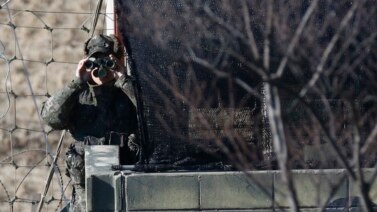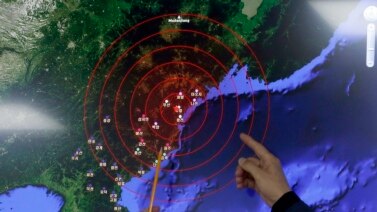
A large American military plane that can carry nuclear weapons flew over South Korea Sunday.
The flight was an answer to North Korea’s claim last week that it had tested a nuclear weapon.
The B-52 bomber was seen flying over an American air base about 72 kilometers south of the North Korean border. The long-range bomber then returned to its base in Guam. The bomber was guarded by two fighter planes -- one each from the United States and South Korea.
Admiral Harry B. Harris Jr. leads the U.S. Pacific Command. He said the flight showed America’s commitment to South Korea and Japan and “defense of the American homeland.”
Lieutenant General Terrence O'Shaughnessy is the deputy commander of U.S. Forces Korea. He told reporters after the flight that the United States is committed “to stability on the Korean peninsula.”
The U.S. also sent a long-range bomber over South Korea in 2013 after the North carried out its third nuclear test.
The United States may deploy an aircraft carrier near the Korean peninsula, reported the Yonhap news agency, which is supported by the South Korean government.
I’m Jonathan Evans.
VOANews.com reported this story from Washington. Christopher Jones-Cruise adapted it into VOA Learning English. Kathleen Struck was the editor.
Do you agree with the decision to fly a B-52 bomber over South Korea? We want to hear from you. Write to us in the Comments Section, or visit our Facebook page.
Words in This Story
bomber – n. a military aircraft designed for dropping bombs
long-range – adj. able to travel or be used over great distances
sign – n. a motion, action or movement that is used to express a thought, command or wish
homeland – n. a usually large area where a particular group of people can live; a country
committed – adj.willing to give your time, energy, etc., to something
stability – n. the quality or state of something that is not easily changed or likely to change
aircraft carrier – n. a military ship that has a large deck, or area, where aircraft take off and land

